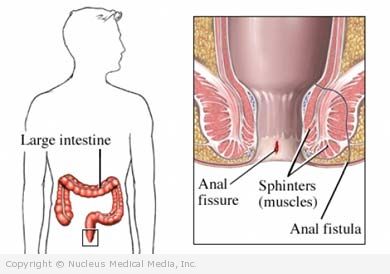(Stool Soiling; Fecal Incontinence; Soiling, Stool)
Encopresis – Definition
Encopresis is the passage of stool in places other than the toilet. It is often an involuntary action. Encopresis is often called stool soiling because of the stains left on underwear.
Accidents are normal in infants and toddlers until they learn bowel control. It is considered stool soiling in children aged four years and older.
Encopresis – Causes
Encopresis may be caused by a variety of conditions such as:
- Chronic constipation
- Most common cause
- When a large amount of hard, dry stool is filling the rectum, over time the child becomes unable to recognize the sensation of fullness and the need to defecate.
- Liquid stool may leak around the hard mass of stool, causing staining of the underwear.
- May be associated with a diet low in fiber and lack of exercise
- Poor toilet training or refusal to use the toilet for bowel movements
- Emotional problems
- Organic causes(rare) — result of problems or malformations in the intestines
Encopresis – Risk Factors
Risk factors include:
- Sex: male
- Children with emotional problems, such as:
- Oppositional defiant disorder
- Conduct disorders
- Toileting phobias
- Passage of firm stool that causes a painful tear or “fissure” at the opening of the anus
- Children who have suffered sexual abuse (according to some researchers)
Encopresis – Symptoms
The main symptom is the accidental passage of stool, usually into the underwear. Other symptoms may include:
- Low self-esteem
- Feelings of embarrassment, shame, or guilt
If associated with constipation your child may have:
- Infrequent bowel movement
- Pain with defecation
- Abdominal pain
- Bed wetting
When Should I Call the Doctor?
Call the doctor if your child has stool staining in his underwear. The doctor can help find the underlying cause.
Encopresis – Diagnosis
The doctor will ask about your child’s symptoms and medical history. A physical exam will also be done.
Parents are often unaware that their child is constipated. However, they may see their child forcibly holding stool when he has the urge to move his bowels. Your child may also be unwilling to use the toilet in certain locations. These description of stool holding is important for the doctor to know about.
To make a diagnosis, the doctor may order tests, such as:
- Rectal exam — may reveal the presence of a large quantity of hard, dry stool in the rectum
- Abdominal x-ray — may also show stool in the rectum
- Other imaging tests to look for organic cause
Encopresis – Treatment
Treatment will depend on the cause of soiling. As a parent, it is important that you do not shame your child. Some treatment options include:
Bowel Clean-Out
Enemas and laxatives may be recommended if constipation is a problem. It will help to clean out your child’s bowel. These treatments are only used short term. If the constipation is not relieved or if your child passes blood with their stool, further testing may be done. This will help to find the cause of the constipation.
Medications
Your doctor may recommend miralax or other stool softener. This can make it easier for your child to pass stool. It may decrease your child’s reluctance to pass stool.
Dietary Changes
Some constipation can be prevented through simple dietary changes. To help prevent constipation, encourage your child to:
- Eat a healthy diet that is high in fiber.
- Drink plenty of liquids.
Bowel Training
Help your child learn when to use the toilet. For example, encourage your child to go to the bathroom at certain times during the day.
Keep positive. Consider rewards for your child for keeping their clothes clean and using the toilet.
Counseling
Counseling may be needed if your child:
- Has severe problems with toilet training
- Has emotional problems (including family problems)
- Is experiencing shame, guilt, or low self-esteem due to fecal incontinence
Encopresis – Prevention
Following guidelines for toilet training may help prevent encopresis. A healthy, high-fiber diet and adequate liquid intake may also help prevent this condition.

